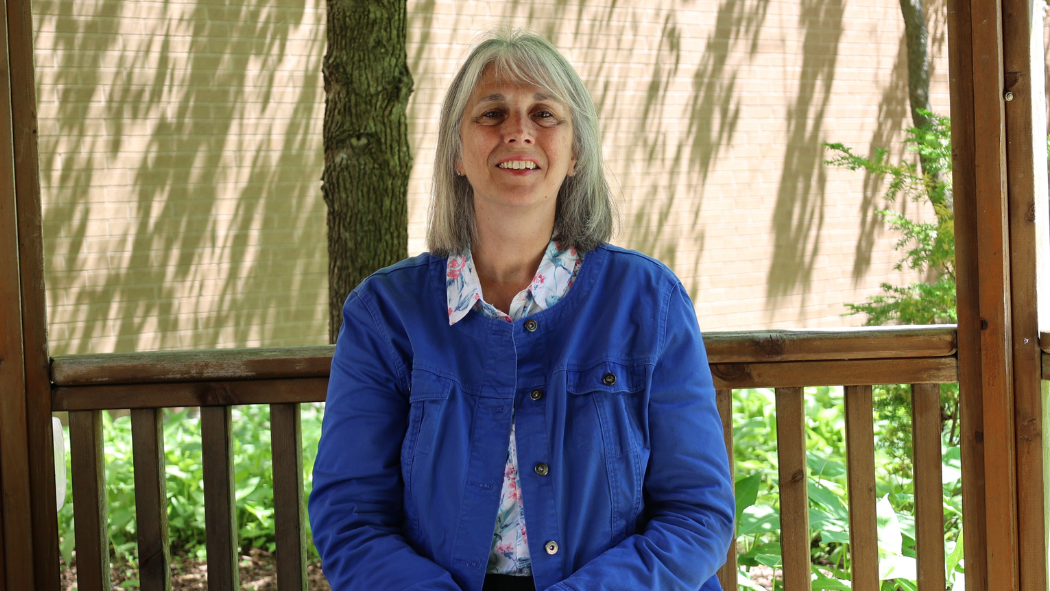
July 10, 2024
“I feel very healthy, except for the cancer,” Christiana Arsenault quips.
Arsenault was diagnosed with breast cancer, underwent treatment and had been continuing her regular breast exams as recommended. She thought her cancer experience was over, but then she developed a cough.
“It was around the time COVID-19 was circulating and I thought it was just a lingering cough from having COVID,” Arsenault explains.
Arsenault mentioned her cough to her oncologist and after some medical imaging, they found that she had a “metatstatic recurrence”, which is a progression of her original disease. This means it is a new presentation of the same cancer (breast cancer) in a different part of her body.
Arsenault has cancer in her lungs, and it was then that a family member brought the Peer Support Program to her attention.
The Peer Support Program
The Peer Support Program was launched in October 2023 at London Health Sciences Centre (LHSC) Verspeeten Family Cancer Centre and is available in-person, or virtually, via telephone or video call. Developed by the Cancer Care Patient and Family/Caregiver Advisory Council, the program is supported by the South West Regional Cancer Program (SWRCP).
The Peer Support Program provides cancer patients, families and caregivers the opportunity, at any point in their cancer journey, to connect one-on-one with a peer support volunteer who has had their own cancer experiences. The program matches volunteer peer support with cancer patients, as well as families and caregivers of cancer patients. Volunteers have a wide range of cancer experiences from being a patient, family member, caregiver or health-care professional and they are matched with peers based on peer preferences.
Christiana’s experience
“I was already speaking with a therapist,” explains Arsenault. “They have a wonderful sense of humor, and they are helpful, but my therapist never had cancer before and what intrigued me about the Peer Support Program, was that I’d be talking with somebody who has gone through it.”
Arsenault chose to connect with her peer over video call in the comfort of her home and shares that she talks about more than her cancer experience with her peer. Her peer has spoken with Arsenault about volunteering in the hospital, about life after work and other ways to get involved at LHSC.
“Since my recent retirement from a fast-paced position, I’ve wanted to look at what I can do beyond work and how I can give back,” says Arsenault. “And my peer has been very supportive in that space beyond the conversations around our cancer experiences.”
Arsenault says that her and her peer enjoy talking about a variety of different topics and feel like they click intellectually. “I believe there’s always time to continue to improve yourself, learn new skills and try new things. Even as I go through treatment, I’m about learning and what new tools I can put in the toolbox for myself. My conversations with my peer have been very fruitful.”
Arsenault has found her experience in the Peer Support Program valuable and would recommend it for patients and caregivers.
“My experience in this program has been great,” Arsenault shares. “It’s so valuable to go through the cancer journey with someone who understands the highs and lows. I can only talk so much to my family about this, and I don’t want to burden them. I feel fortunate to have this connection – it’s never a dull moment because we always find something to talk about.”
If you are a cancer patient or the family member or caregiver of a cancer patient at LHSC and want to learn more about the Peer Support Program and request peer support, please visit the Peer Support Program webpage on LHSC’s website.
If you are interested in becoming a volunteer peer support person, please visit the Peer Support Volunteer Role webpage on LHSC’s website.
View the video transcript for "The Peer Support Program supports patients in the Verspeeten Family Cancer Centre."
